Northern Ireland manager: What's awaiting Michael O'Neill's successor
- Published
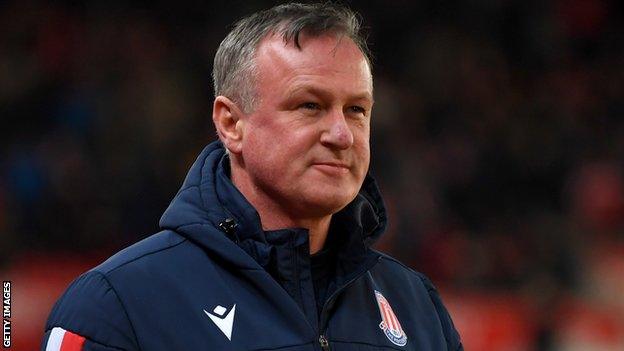
Michael O'Neill's Stoke City are currently 17th in the Championship table
Tommy Wright's departure from St Johnstone earlier in May added a new dimension to the debate about who should succeed Michael O'Neill as Northern Ireland manager.
The former Newcastle United goalkeeper is believed to be among the leading contenders to become Northern Ireland boss after O'Neill left the post in April to concentrate fully on leading Championship side Stoke City.
Ian Baraclough, already employed by the Irish FA as the Under-21 manager, is considered by some to be the frontrunner for the senior team job, while Motherwell boss Stephen Robinson, once part of O'Neill's backroom staff, is also strongly favoured by bookmakers.
Whether it is one of these three - or a more surprise choice, such as David Healy or Jim Magilton - the to-do list sitting on the desk of whoever is appointed will be the same.
Some items in that in-tray are far from new, but no less important, while others have arisen as a result of O'Neill's departure.
Here, we take a look at five things which could go a long way to defining how successful the new Northern Ireland manager proves to be.
Hitting the international ground running
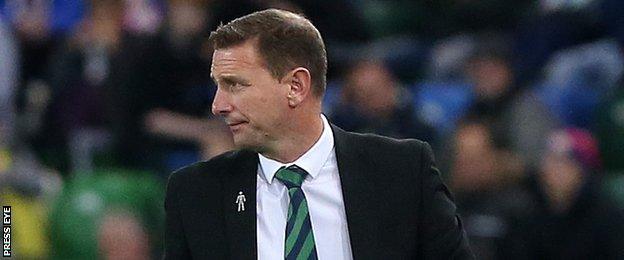
Baraclough has been in charge of the Northern Ireland Under-21 team since 2017
Given the positivity of the last six years of his tenure, it can perhaps be easy to forget that it took O'Neill no less than 10 matches before he recorded his first win as Northern Ireland boss.
A Martin Paterson header gave O'Neill's men a landmark home victory over Russia in August 2013, but only after a nine-game opening sequence that included four defeats and disappointing home draws against international minnows Luxembourg and Azerbaijan.
The landscape, however, is considerably different now we are out the other side of the O'Neill era.
With the delayed Euro 2020 play-off away to Bosnia-Herzegovina possibly being rescheduled for late October, there can be few new NI managers who will have had to face a game of such magnitude so early in their reign.
And, of course, if the new man gets a win in Bosnia, then there is the small matter of a tantalising encounter against either the Republic of Ireland or Slovakia at Windsor Park a few days later to navigate for a place in the finals.
It remains to be seen what, if any, matches Northern Ireland will have before the Euro play-off but, either way, the proverbial baptism of fire awaits the incoming boss.
Wright, Robinson and Baraclough have varying degrees of international football experience, but one of their biggest challenges will no doubt be getting their feet under their Windsor Park desk quickly enough to make the desired impact and lead NI to a second successive European Championship.
Establishing relationships with the senior players
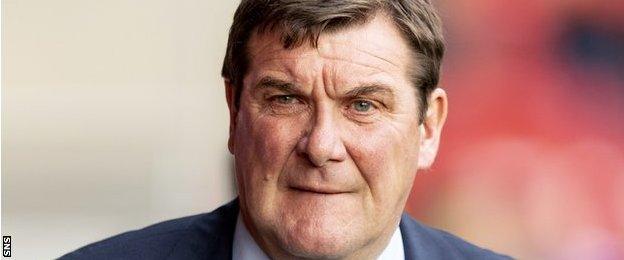
Tommy Wright ended a seven-year spell with St Johnstone when he resigned last week
A key feature of O'Neill's reign was the close bond he made with a strong core of senior players, a feature which provided consistency and assuredness for the past three qualifying campaigns in particular.
Gareth McAuley, Aaron Hughes, Chris Brunt and Chris Baird may have since retired from international football, but they, along with Steven Davis and Jonny Evans, formed a group which proved to be a major asset to O'Neill and the direction of travel in which he wished to take the squad.
That manager-player trust and respect, which is a key ingredient to any successful dressing room, was built carefully and strategically by O'Neill, and it is something the new boss would do well to cultivate in a similar manner.
The importance of talismanic captain Davis, both on the pitch and off it, has rightly been highlighted many times. To the relief no doubt of every Northern Ireland fan, the Rangers midfielder has shown no intentions of retiring from international football, and his ongoing presence should be a major boost for whoever takes over.
Craig Cathcart, Stuart Dallas and Josh Magennis - as well as Corry Evans when available - have all assumed increasing importance during the Euro 2020 qualifying campaign. Ensuring he has the total faith of such stalwarts could prove crucial to the new manager's chances of success.
The perennial problem up front
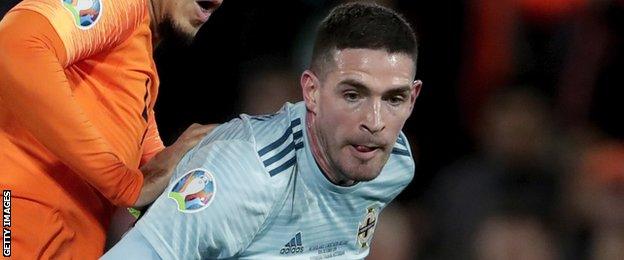
Kyle Lafferty is without a goal in the Euro 2020 qualifying campaign
A number of positive factors helped lead to Northern Ireland's qualification for Euro 2016, many of which the team have maintained and indeed enhanced since then.
One element which sadly isn't still present is that of an in-form striker scoring goals on a regular basis. Kyle Lafferty's goals - seven in 10 games - blazed a trail to France for the Green and White Army, but the former Rangers forward, now at Sunderland, has not scored an international goal since November 2016.
Magennis, Conor Washington and Liam Boyce have taken it in turns with Lafferty to lead the line since the summer of 2016, and Magennis enjoyed his most prolific spell in a Northern Ireland shirt recently, scoring three goals during 2019.
While that run included vital winners against Belarus and Estonia, it was some way off the contribution made by Lafferty in 2014 and 2015, and O'Neill was clearly aware of the goalscoring challenge his squad faced.
Kyle Vassell's surprise call-up to the squad for a Nations League double-header in October 2018 had most fans carrying out a Google search to see who he was, but his stint in the squad was short-lived and only seemed to push Will Grigg - once considered by some to be the most natural finisher at O'Neill's disposal - further out of the international exit door.
The margins between success and failure are at their finest in the international arena, and an in-form striker with a natural goalscoring instinct can be the difference when clear-cut chances are scarce.
Linfield striker Shayne Lavery made a sensational start to this season, with his form during the Blues' impressive Europa League run in particular earning him a place in the NI squad for matches against Germany and the Netherlands. His goals have dried up, however, and there are no obvious alternatives outside the squad regulars for the new manager to turn to.
The non-playing goalkeepers
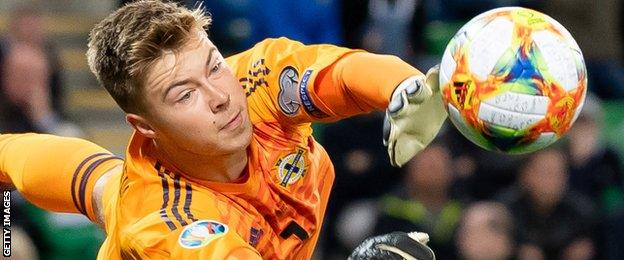
Peacock-Farrell joined Burnley from Leeds last summer
Having got into the team midway through the qualifying campaign following an injury to Roy Carroll, goalkeeper Michael McGovern returned from the Euros in France as something of a hero after an outstanding performance against Germany that went a long way to securing a place in the last 16.
Indeed, McGovern's exploits in France helped earn him a move from Scottish Premiership side Hamilton to Norwich City, but his appearances for the Canaries have been minimal, with the County Fermanagh man getting on the pitch only three times this season.
While O'Neill stuck with McGovern for the 2018 World Cup qualifying campaign, his lack of game time led the NI boss to turn to then 21-year-old Bailey Peacock-Farrell for the Nations League series and subsequent Euro 2020 qualifiers.
Having impressed after breaking into the Leeds United side, Peacock-Farrell soon began to looked assured on the international stage - so much so that the Premier League came calling last summer in the shape of a move to Burnley.
Unfortunately, history has repeated itself, with Peacock-Farrell not having made a single appearance in the top flight this term, though O'Neill continued to play him in this season's games against Germany and the Netherlands.
Match fitness may be more of a level playing field because of the coronavirus lockdown but, with Trevor Carson also having played very little at Motherwell, the new manager is likely to have to go into the Euro 2020 play-off semi-final with a keeper whose last competitive match will have been even further away than for most.
Ensuring evolution continues
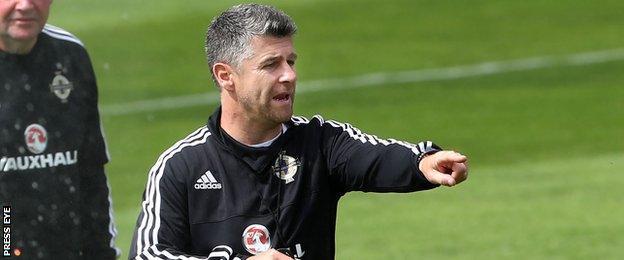
Stephen Robinson was part of Michael O'Neill's backroom team at Euro 2016
O'Neill's meticulous attention to detail and studious preparation for matches are widely acknowledged to have been among his most valuable traits as an international manager.
One of his biggest achievements, however, has been in overseeing the evolution of the squad that reached the Euro 2016 finals while all the while ensuring that his side remained extremely competitive in qualification matches.
O'Neill cut a forlorn figure as he trudged off the pitch after the cruel World Cup 2018 play-off loss to Switzerland in November 2017, his own future as manager uncertain and players such as Brunt, McAuley and Hughes coming to the end of their international careers.
After signing a lucrative new contract in February 2018, however, there was a renewed vigour as the inaugural Nations League series arrived that autumn. Players such as George Saville, Jamal Lewis, Jordan Jones, Gavin Whyte and Peacock-Farrell were introduced and have become key members of the squad.
While perhaps not an immediate priority, continually monitoring the under-age set-ups and closely scrutinising the English and Scottish leagues for any potential new players that are eligible will be another important development tool for the new boss. It will mean that the inevitable loss of Davis, when it comes, can be softened somewhat.
No less important will be the scouting reports made on the talent coming through the Irish League, with a number of squad regulars having gone on to make their international debuts not long after graduating from Northern Ireland's increasingly more professional top flight.